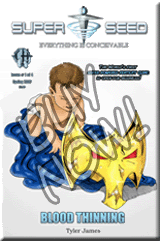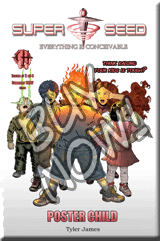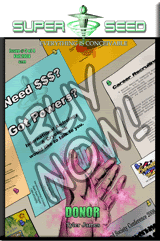
It's that time again. If you've missed any previous installments of this series on writing process, fret not. Parts I, II, III, IV, V, and VI are just a click away. Let's get started on today's topic...
VII. Memorable Scenes
When we remember movies we've enjoyed or comic books we couldn't put down, even the great ones, it usually is not the entire story from start to finish we recall. What we remember are scenes. Want your creative works to move people and stick in their heads long after they've put down the page or left the theaters? It's actually pretty simple. Fill your writing with a series of strong scenes and before you know it, you're going to have a story people remember and can't stop talking about.
Before continuing, let's talk briefly about what a scene is. The simple definition: a scene is where something specific happens, in a specific place, at a specific time. Remember that. Place and time. Two things every scene must have. If you change either place or time, guess what? You have a new scene.
Generally, there are two types of scenes. Action scenes (chases, fights, sex, etc.) and dialogue scenes (on the phone, over coffee, in bed, etc.) Most scenes in comics and film are a combination of the two. Regardless of the type, the purpose of every scene is to move your story forward. That's it. Simple right?
To illustrate the concepts and suggestions for crafting your scenes, I've included two very memorable scenes from movies. These scenes are very different and the movies are very different, but in terms of scene structure and craft, they are very much the same. So grab your popcorn, watch them both, and we'll then we'll continue. Sound good?
Scene 1 - Suicide Kings (1997)
Powered By: VideoBuzz
Scene 2 - When Harry Met Sally (1989)
Enjoy those? Good. Now let's deconstruct.
Why are these great scenes? Well, yes, the acting was strong. Dennis Leary and Meg Ryan both completely stole their scenes with strong performances. And certainly the dialogue was very well written. "...or me and Mickey Mantle are gonna pay you a visit." Awesome. (We're going to talk more about crafting strong dialogue next time.) Still, there's more at play hear than sharp dialogue and strong performances. How can we craft scenes this strong? Here are some tips.
First, start with CONTEXT. The first thing to determine when drafting a scene is the purpose of the scene in your story. How is it moving the story forward? When and where does it take place? What characters are in the scene, and what are they doing there. This is the scene's context. For most scenes, you can sum up the context in a sentence or two.
In the Suicide Kings scene, the context is that Dennis Leary's character needs to find the woman in order to help track down his kidnapped boss. In When Harry Met Sally, the context is that Harry and Sally's relationship changes when Harry sees her in a new, more sexual, light.
Now develop the CONTENT. What aspects of your character's lives do you want to reveal in the scene? How are you going to reveal them? What are you actually going to show? What is the most interesting and appealing way you can deliver what needs to happen to move your story along (the context) to your audience?
In Harry, it's not just Billy Crystal who is surprised. This is the first time the audience gets to see the sexual side of cute-as-a-button Meg Ryan as well. Dramatically and comedically, the best way to reveal that was to have her fake an orgasm in public. Yup, that gets the job done. In Kings, we get a bit of insight into Leary's character's past. Up until this point in the movie, we've seen Leary get very angry and threaten violence, but we've also seen him be charitable, and not actually commit any violent acts. Interestingly enough, his first response isn't to resort to violence, he actually sympathizes with the guy. But all the while, the audience suspects that if pushed, Leary's character is one who could fly off the handle. But none of us saw the toaster coming.
Two scenes. Each very different. Both extrememly mememorable. Here are some more tips to keep in mind when crafting your scenes.
All scenes need to turn. "Turning" is a phrase used a lot in storytelling. It's actually quite a simple concept, in that something specific should change in every scene you write. Think about the specific value at stake for the characters in your story. It could be love, forgiveness, revenge, you name it. Think about how that value is charged at the beginning of the scene (positive, negative, a little of both?) Then think about how that value is charged at the end of the scene? If the value remains unchanged from start to finish, then the scene has not turned. It's a non-event. And you'll need to ask yourself, why is this scene in my story?
Usually, when you have a scene that doesn't turn, the answer to why it's in your story is for the purpose of exposition. (ex. This is the scene where I reveal that Jack's dog was killed when he was six.) Professional writers know that that exposition by itself is not a good enough reason to include a scene. If the exposition is important, a good writer will find a way to include it amid the action of a scene that turns.
What turns in the scene from Harry? The scene starts with a confident and cocky Billy Crystal, gabbing casually about his one-night stand and sexual prowess, once again seeming to win an argument with Meg Ryan. But once she fakes her O, the tables turn completely. She wins the argument that women can fake believeably and Billy Crystal is left speechless. The scene opens advantage Crystal. It closes advantage Ryan. This is a scene that turns.
Scenes are unified around "Desire, Action, Conflict, and Change." This is a gem from McKee, and worth taking note of. If all of your scenes involve a character with a strong external or internal need or want (desire), who takes dramatic steps to achieve that want (action), meets formidable resistance to attaining that goal (conflict), and his internal or external course is altered because of it (change), you're going to have compelling scenes.
Foreshadowing is a powerful tool. Whether you're writing for comedy or drama, it's necessary that you set up your scenes. Lew Hunter says, "Anticipation is often as wonderful, or as suspenseful, as the realization of the end result." In Suicide Kings, the toaster scene was foreshadowed by Leary's earlier interaction with a bum who asked him for money. At first, Leary gave the bum some money, but when the bum pushed his luck, Leary got enraged and almost killed the guy, only to be stopped by his partner. This foreshadowed the altercation in the toaster scene. When the dirty old man tells him off, the audience knows there is no one to stop Leary from bringing the pain on this man, and we cringe with anticipation, even before we see him wrap the toaster around his hands.
Memorable scenes have "toppers." Toppers are the closing lines or actions that add one last bit of punch or umph to the scenes. So many great scenes have them, that it's worth considering adding them to your key scenes. In Harry, the topper is the old lady, having watched Meg Ryan in awe, tell the waiter, "I'll have what she's having." Funny. (And, interestingly enough, this line was not in the screenplay, but added on set, suggested by the talented Mr. Crystal.) And how about the Suicide Kings line? "Sorry about the toaster." After such a brutal scene, it's amazing how one line can induce a chuckle. And it makes the scene all the more memorable.
To illustrate how I've been trying to follow these principles, what follows is a short scene from my screenplay/graphic novel project. In the scene, three boys MATT, SOOTCH, and TROY, have lost their football in the neighbor's yard, which is guarded by BRUTUS, a mean old dog. Sootch, a tiny asian, is tasked with retrieving it.

EXT. NEIGHBOR'S FENCE - NIGHT
Sootch, Troy, and Matt compare twigs. Sootch's is the shortest.
MATT
Yes!
TROY
It's you, Sootch.
SOOTCH
Mine's the shortest?
Big surprise.
The boys stand next to the tall fence with a large sign that reads, "Beware of Dog."
Troy peers through the fence.
TROY
Don't worry, dude.
Brutus is totally asleep.
EXT. INSIDE FENCE
Brutus rests in the yard, eyes closed, just inches from the football.
EXT. OUTSIDE FENCE
Sootch pulls away from the fence.
SOOTCH
You positive, Troy?
TROY
Yeah. He's out.
Let's do this.
Matt and Troy boost Sootch over the fence.
EXT. INSIDE FENCE
Sootch lands silently, striking a cat-like pose.
SOOTCH (whispers)
I am ninja.
Brutus lets out a grunt, but his eyes stay closed. Sootch creeps toward the ball, eyes trained on the sleeping dog.
He carefully bends down and palms the ball, just inches from BRUTUS. He picks up the ball.
Brutus opens his eyes and for a moment, they stare each other down.
EXT. OUTSIDE FENCE
Matt and Troy are mortified.
MATT
He's dead.
EXT. INSIDE FENCE
Sootch hauls ass toward the fence with Brutus in hot pursuit. He tosses the ball over the fence, screaming all the while.
Just as Sootch is about to reach the fence, Brutus leaps at him, but is violently jerked back by his just-too-short chain. Sootch bounds up and over the fence.
EXT. OUTSIDE FENCE
The boys congratulate a panting Sootch. An angry Brutus BARKS through the fence.
TROY
You can't throw for crap,
but you sure can run.
Now, let's review my scene by running through my scene tip checklist...
- Did the scene turn? Yup, at the start, the boys were fearful and without the ball. At the end they retrieved the ball and were elated.
- Was there desire? Sure, they wanted the boal.
- Was there action? Yes, Sootch, though reluctant, took up the challenge of recovering the ball.
- Was there conflict? The angry Brutus definitely brought the conflict.
- Was there change? Sure, they have the ball, and Sootch, who up until this point in the script had been bagged on repeatedly for being a lousy athlete, got to be a bit of a hero.
- Was this scene foreshadowed? Kind of. We saw a beware of dog sign earlier in the script, and when the ball was lost over the fence initially, the look of fear on Matt's face suggested it was trouble.
- Was there a topper? Certainly. Troy's line at the end adds a little punctuation point to the scene, and is a nice counterpoint to Troy's first comment earlier in the script, about how there will never be an Asian quarterback in the NFL.
Is this the greatest scene in the world? Certainly not. It's actually a fairly small scene in the script. Still, for a small scene, it follows the conventions that have proven to make scenes memorable. Now, do all the scenes in my screenplay hold up to this scrutiny. Hmm...that I'm not sure about. Should they? Most definitely.
NEXT: VIII. Sharp Dialogue











1 comment:
Good stuff Ty. I think I'll add Suicide Kings to my netflix queue
Post a Comment